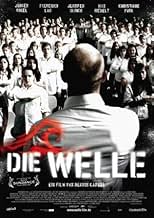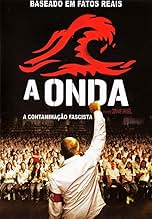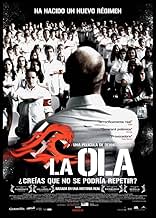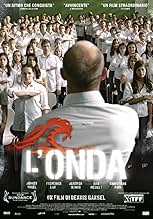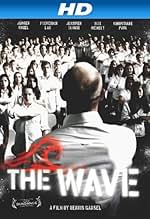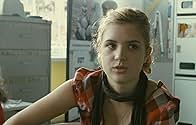NOTE IMDb
7,6/10
119 k
MA NOTE
Un professeur de lycée cherche à expliquer à ses élèves ce qu'est la vie sous une dictature. L'expérience tourne mal alors que ses élèves échappent à son contrôle.Un professeur de lycée cherche à expliquer à ses élèves ce qu'est la vie sous une dictature. L'expérience tourne mal alors que ses élèves échappent à son contrôle.Un professeur de lycée cherche à expliquer à ses élèves ce qu'est la vie sous une dictature. L'expérience tourne mal alors que ses élèves échappent à son contrôle.
- Réalisation
- Scénario
- Casting principal
- Récompenses
- 9 victoires et 8 nominations au total
Avis à la une
Die Welle details how a project on autocracy gradually leads to disastrous results. Initially without enthusiasm to teach the topic, Rainer Wegner conducts an unorthodox experiment to demonstrate to his students (equally lukewarm to start with) what life would be like under fascism. Neatly structured by days, the experiment begins with simple disciplines and grows to become an exclusive cult named "the wave" with its own uniform and salute.
Similar to his 2004 film "Before the Fall" which concerns the Nazi's seduction of youth, Dennis Gansel probes the individual psychologies that bring about uncontrollable collective movement, and how personal life is transformed by it. It offers a balanced view on an organisation like "The Wave" by enquiring whether it is a crystallisation of the students' class-free utopia (at the cost of losing individuality) or a community for those in need of belonging and empowerment.
What is frightening is that many (though not all) of them voluntarily follow the conformity through reasoning. Ironically, the mob mentality engulfing the students is what they condemn formerly; even the "anarchist" Rainer finds himself intoxicated with his increasingly idolised status.
An engaging and powerful film with a sense of humour, suspension (terror arises when the light goes off during Karo's anti-Wave poster distribution), twist (Rainer's concluding speech), believable characterisation and excellent acting (Jürgen Vogel, Max Riemelt, and Frederick Lau). Inspired by a true event in California , this intelligent film merits attention particularly because of its non-preaching and humanistic treatment of a heavy subject.
Similar to his 2004 film "Before the Fall" which concerns the Nazi's seduction of youth, Dennis Gansel probes the individual psychologies that bring about uncontrollable collective movement, and how personal life is transformed by it. It offers a balanced view on an organisation like "The Wave" by enquiring whether it is a crystallisation of the students' class-free utopia (at the cost of losing individuality) or a community for those in need of belonging and empowerment.
What is frightening is that many (though not all) of them voluntarily follow the conformity through reasoning. Ironically, the mob mentality engulfing the students is what they condemn formerly; even the "anarchist" Rainer finds himself intoxicated with his increasingly idolised status.
An engaging and powerful film with a sense of humour, suspension (terror arises when the light goes off during Karo's anti-Wave poster distribution), twist (Rainer's concluding speech), believable characterisation and excellent acting (Jürgen Vogel, Max Riemelt, and Frederick Lau). Inspired by a true event in California , this intelligent film merits attention particularly because of its non-preaching and humanistic treatment of a heavy subject.
An amiable German social sciences teacher has to teach his children about an autocratic government. The children at first seem bored, not wanting to hear any more about The Third Reich and Nazism. The teacher is surprised. "We're too knowledgeable to ever fall into something like that again," say the students. The teacher then decides to show the children what it's like to live in an autocracy, and sets up a simple experiment in class. They elect a leader (him) and he begins to instill in them (merely as an example) the virtues and practices that accompany an autocracy ("Strength through discipline", "Work as one"). The students take to it, and become obsessed with it. Soon, what was a simple classroom experiment grows to a social entity all it's own, with the teacher not sure if he can reverse the effects.
The film was very well acted and written, and was seriously creepy. It showed how - easily a society could fall into fascism, if presented to the society in the correct way. Watching the film, I understood why the students enjoyed the new system, but was also privy to the horrors that come with it. A shocking and powerful film. The way the different children reacted and how such a seemingly innocent experiment profoundly affected their lives was incredible and horrifying. Vogel gives a powerful performance as an idealistic teacher who isn't aware of the influence he has on others. Worth seeing.
The film was very well acted and written, and was seriously creepy. It showed how - easily a society could fall into fascism, if presented to the society in the correct way. Watching the film, I understood why the students enjoyed the new system, but was also privy to the horrors that come with it. A shocking and powerful film. The way the different children reacted and how such a seemingly innocent experiment profoundly affected their lives was incredible and horrifying. Vogel gives a powerful performance as an idealistic teacher who isn't aware of the influence he has on others. Worth seeing.
That's what the title "Die Welle" means. A teacher makes an experiment. He wants his class to understand what autocracy means. It starts with them stopping calling him by first name. Then they have to rise while addressed. Then, there are uniforms and a special saluting. And then, it runs out of control.
The most disturbing thing is that the teacher slowly loses control over himself, until there is a disaster.
OK, does it take a week to form young people to fascists? That's not the point. How ever long it takes, the interesting answer here is that it is possible at all. Do we run that risk too? Well, if you look into yourself, you maybe won't find a fascist, but you'll probably find someone who wants to be a part of something. Whatever it is.
The most disturbing thing is that the teacher slowly loses control over himself, until there is a disaster.
OK, does it take a week to form young people to fascists? That's not the point. How ever long it takes, the interesting answer here is that it is possible at all. Do we run that risk too? Well, if you look into yourself, you maybe won't find a fascist, but you'll probably find someone who wants to be a part of something. Whatever it is.
This is a German film (subtitled) about a school project looking at autocracy (a la Nazi Germany). In order for the teacher to persuade his pupils that autocracy remains a real threat to democracy, he persuades them to take part in a class dictatorship. The key difference between this and your average school classroom is that he convinces the pupils not just to obey but also to want his every command. Of course the project turns bad and things get scary.
What I liked about the film was that it did not treat the pupils as "just kids"; they had brains, opinions, and their own ethics too. It is not a very black and white in it's opinion, you could draw some distinct opinion from the film but I suggest that there are several different opinions that are equally as valid. It keeps you guessing what is going to happen & even deliberately misleads you.
What I liked about the film was that it did not treat the pupils as "just kids"; they had brains, opinions, and their own ethics too. It is not a very black and white in it's opinion, you could draw some distinct opinion from the film but I suggest that there are several different opinions that are equally as valid. It keeps you guessing what is going to happen & even deliberately misleads you.
This is my fourth German film and I'm digging them. Because you asked, I watched "Das Boot," "Downfall," and "Run Lola Run."
I thought "The Wave" was going to be corny. I thought it was going to be about a group of simple-minded kids following a leader because of some bromides. It wasn't that at all.
Rainer Wenger (Jurgen Vogel) was a teacher who was teaching a class on autocracy for project week. After a spit-fire discussion with the class about what autocracy is Mr. Wenger decided to do an experiment with the class. For project week only they would have to do what Mr. Wenger said. There were a few that resisted and left the class, but those who remained were all in. Slowly, we saw the evolution of a movement.
"The Wave" is the negative side of populism. I say that because the Wave, meaning the organization they formed, could easily have been something good. Mr. Wenger had his students doing very constructive and positive stuff. Who doesn't believe that there's strength in unity, who doesn't believe in equality, who doesn't believe in helping their fellow man? Plenty of organizations, religions, and movements purport similar beliefs and they are viewed as being good. It's when people use these goodly aims to form radical armies bent on purging, "cleansing," or otherwise harming those who don't think like them, that makes a movement into a gang. And if the movement is large enough to engulf an entire nation it becomes an autocracy.
"The Wave" gives food for thought. I think the larger lesson wasn't about being a part of something, I think it was about extremism. That very same group with more moderate participants could easily have been an asset to their school and their community. So I don't knock the Wave for its extremists anymore than I knock a religion for its extremists. Don't throw the baby out with the bath water.
I thought "The Wave" was going to be corny. I thought it was going to be about a group of simple-minded kids following a leader because of some bromides. It wasn't that at all.
Rainer Wenger (Jurgen Vogel) was a teacher who was teaching a class on autocracy for project week. After a spit-fire discussion with the class about what autocracy is Mr. Wenger decided to do an experiment with the class. For project week only they would have to do what Mr. Wenger said. There were a few that resisted and left the class, but those who remained were all in. Slowly, we saw the evolution of a movement.
"The Wave" is the negative side of populism. I say that because the Wave, meaning the organization they formed, could easily have been something good. Mr. Wenger had his students doing very constructive and positive stuff. Who doesn't believe that there's strength in unity, who doesn't believe in equality, who doesn't believe in helping their fellow man? Plenty of organizations, religions, and movements purport similar beliefs and they are viewed as being good. It's when people use these goodly aims to form radical armies bent on purging, "cleansing," or otherwise harming those who don't think like them, that makes a movement into a gang. And if the movement is large enough to engulf an entire nation it becomes an autocracy.
"The Wave" gives food for thought. I think the larger lesson wasn't about being a part of something, I think it was about extremism. That very same group with more moderate participants could easily have been an asset to their school and their community. So I don't knock the Wave for its extremists anymore than I knock a religion for its extremists. Don't throw the baby out with the bath water.
Le saviez-vous
- AnecdotesBased on the novel "The Wave" by Todd Strasser (under the pen name Morton Rhue), a fictionalized account of the "Third Wave" teaching experiment by Ron Jones that took place in a Cubberley High School history class in Palo Alto, California in April 1967.
- GaffesAlthough set somewhere in western Germany, all policemen wear insignia of the state of Berlin.
- Citations
Rainer Wenger: So you don't think there could be another dictatorship in Germany?
Jens: No, we are too enlightened now.
- Crédits fousOpening and closing credits appear as graffiti.
- ConnexionsFeatured in Die Johannes B. Kerner Show: Épisode datant du 12 mars 2008 (2008)
- Bandes originalesRock 'n' Roll High School
Written by Joey Ramone, Johnny Ramone and Dee Dee Ramone
Performed by EL*KE
Produced by Mirko Schaffer
©1980 WB Music Corp. and Taco Tunes
Meilleurs choix
Connectez-vous pour évaluer et suivre la liste de favoris afin de recevoir des recommandations personnalisées
- How long is The Wave?Alimenté par Alexa
Détails
- Date de sortie
- Pays d’origine
- Site officiel
- Langue
- Aussi connu sous le nom de
- La ola
- Lieux de tournage
- Sociétés de production
- Voir plus de crédits d'entreprise sur IMDbPro
Box-office
- Budget
- 5 000 000 € (estimé)
- Montant brut mondial
- 32 350 637 $US
- Durée
- 1h 47min(107 min)
- Couleur
- Mixage
- Rapport de forme
- 2.35 : 1
Contribuer à cette page
Suggérer une modification ou ajouter du contenu manquant





